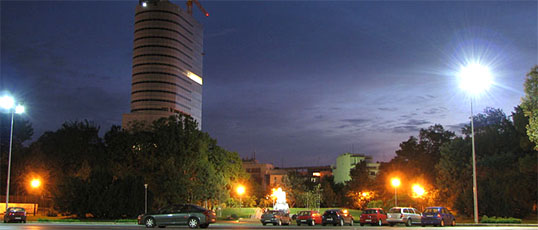ADVERTISEMENT
|
|
|
Romania Travel & Tourism Guide
Economy of Romania
NextGen Day offers travel tips and information for top travel places and best destinations in Africa, Asia, Australia, Europe, Middle East and United States of America. We feature Europe links, Europe resources and large selection of Europe budget airlines, Europe chartered planes, Europe sea cruises, Europe ferries, Europe travel agencies, Europe land transports and Europe attractions including Europe beaches, Europe medical tourism, Europe retirement homes, Europe historical and Europe pilgrimage tours.

Bucharest Tower Center in Bucharest is the tallest building in Romania
With a GDP of around $264 billion and a GDP per capita (PPP) of $12,285 estimated for 2008, Romania is an upper-middle income country economy and has been part of the European Union since January 1, 2007. After the Communist regime was overthrown in late 1989, the country experienced a decade of economic instability and decline, led in part by an obsolete industrial base and a lack of structural reform. From 2000 onwards, however, the Romanian economy was transformed into one of relative macroeconomic stability, characterised by high growth, low unemployment and declining inflation. In 2006, according to the Romanian Statistics Office, GDP growth in real terms was recorded at 7.7%, one of the highest rates in Europe. Growth dampened to 6.1% in 2007, but was expected to exceed 8% in 2008 because of a high production forecast in agriculture (30-50% higher than in 2007). The GDP grew by 8.9% in the first nine months of 2008, but growth fell to 2.9% in the fourth quarter and stood at 7.1% for the whole 2008 because of the financial crisis.[citation needed] Unemployment in Romania was at 3.9% in September 2007, which is very low compared to other middle-sized or large European countries such as Poland, France, Germany and Spain. Foreign debt is also comparatively low, at 20.3% of GDP. Exports have increased substantially in the past few years, with a 25% year-on-year rise in exports in the first quarter of 2006. Romania's main exports are clothing and textiles, industrial machinery, electrical and electronic equipment, metallurgic products, raw materials, cars, military equipment, software, pharmaceuticals, fine chemicals, and agricultural products (fruits, vegetables, and flowers). Trade is mostly centred on the member states of the European Union, with Germany and Italy being the country's single largest trading partners. The country, however, maintains a large trade deficit, which increased sharply during 2007 by 50%, to €15 billon.
After a series of privatisations and reforms in the late 1990s and early 2000s, government intervention in the Romanian economy is somewhat lower than in other European economies. In 2005, the government replaced Romania's progressive tax system with a flat tax of 16% for both personal income and corporate profit, resulting in the country having the lowest fiscal burden in the European Union, a factor which has contributed to the growth of the private sector. The economy is predominantly based on services, which account for 55% of GDP, even though industry and agriculture also have significant contributions, making up 35% and 10% of GDP, respectively. Additionally, 32% of the Romanian population is employed in agriculture and primary production, one of the highest rates in Europe. Since 2000, Romania has attracted increasing amounts of foreign investment, becoming the single largest investment destination in Southeastern and Central Europe. Foreign direct investment was valued at €8.3 billion in 2006. According to a 2006 World Bank report, Romania currently ranks 49th out of 175 economies in the ease of doing business, scoring higher than other countries in the region such as Hungary and the Czech Republic. Additionally, the same study judged it to be the world's second-fastest economic reformer in 2006. The average gross wage per month in Romania was 2023 lei in December 2008, equating to €470.22 (US$592.64) based on international exchange rates, and $1110.31 based on purchasing power parity.
Source: Wikipedia Encyclopedia |

